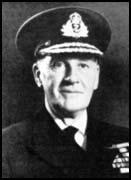James Somerville

James Somerville was born in Weybridge, Surrey on 17th July 1882. He became a navy cadet at fifteen and by 1904 was a lieutenant in the Royal Navy.
Somerville became the navy's leading radio specialist and during the First World War he won the DSO for his achievements at the Dardanelles.
After the war Somerville remained in the navy and in 1933 he was promoted to rear admiral. In 1936 Somerville commanded the Mediterranean destroyer flotillas and during the Spanish Civil War he helped protect Majorca from the Republicans.
In April 1938 Somerville was invalided home and was diagnosed as suffering from tuberculosis. However, on the outbreak of the Second World War he was recalled to duty and for the next year carried out important work developing naval radar.
In May 1940 Somerville served under Admiral Bertram Ramsay at Dunkirk. This was followed by becoming naval commander of Force H based at Gibraltar. This included the carrier Ark Royal and the battlecruiser Hood.
After Henri-Philippe Petain signed the armistice on 22nd June 1940 Winston Churchill gave Somerville the task of attacking the French Navy at Mers-el-Kébir.
On 9th February 1941 Somerville organized the bombardment of Genoa and played an important role in the sinking of Bismarck on 26th May 1941.
In March 1942 Sommerville was given command of the Eastern Fleet. He was based at Ceylon until the Japanese advance forced him to move to Kilindini, Kenya.
Sommerville lost command of the Eastern Fleet in August 1944 and two months later was placed in charge of the British Naval Delegation in Washington. Somerville was promoted to admiral of the fleet in May 1945.
After the war James Somerville retired to Wells in Somerset where he died on 19th March 1949.
